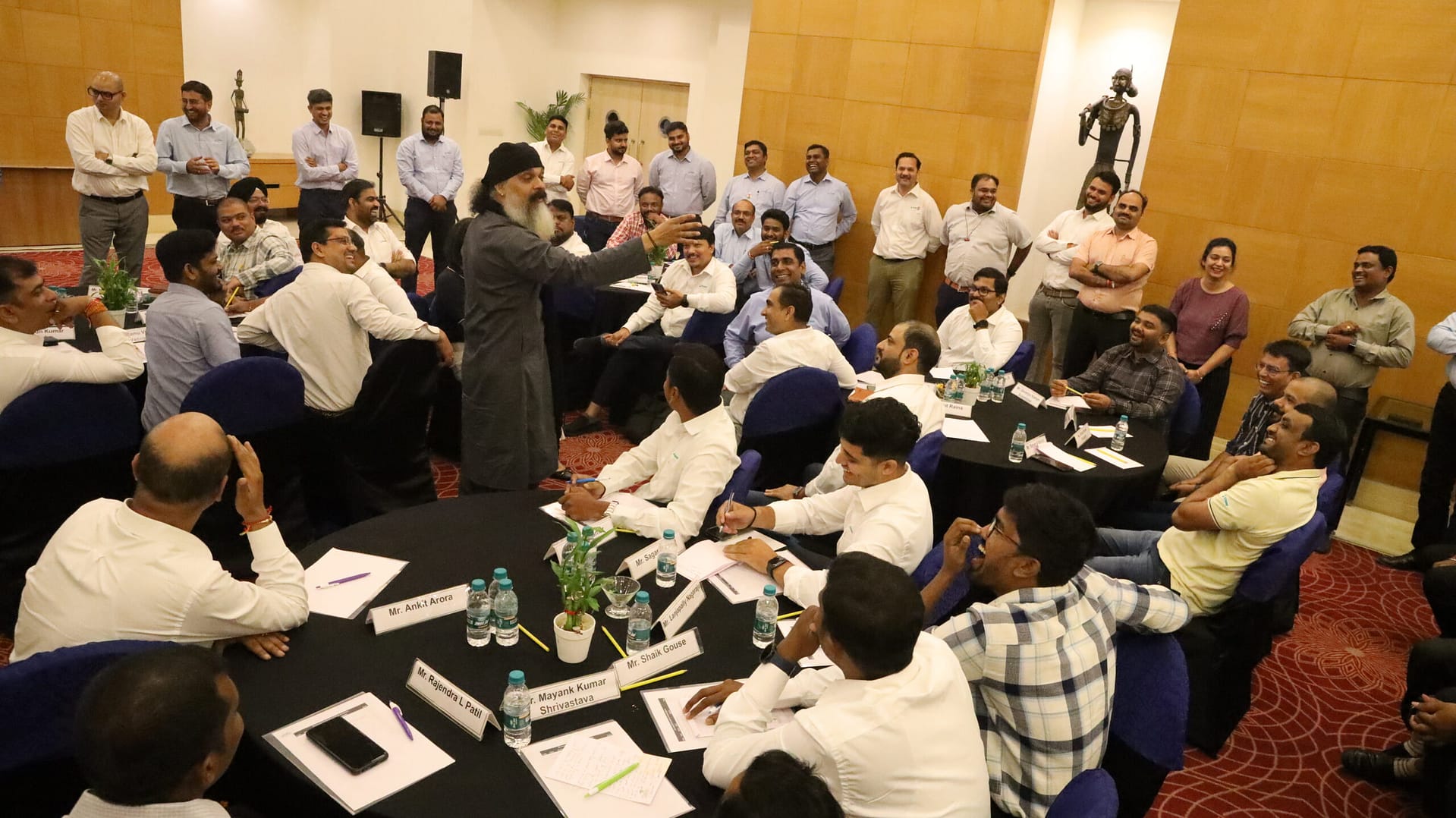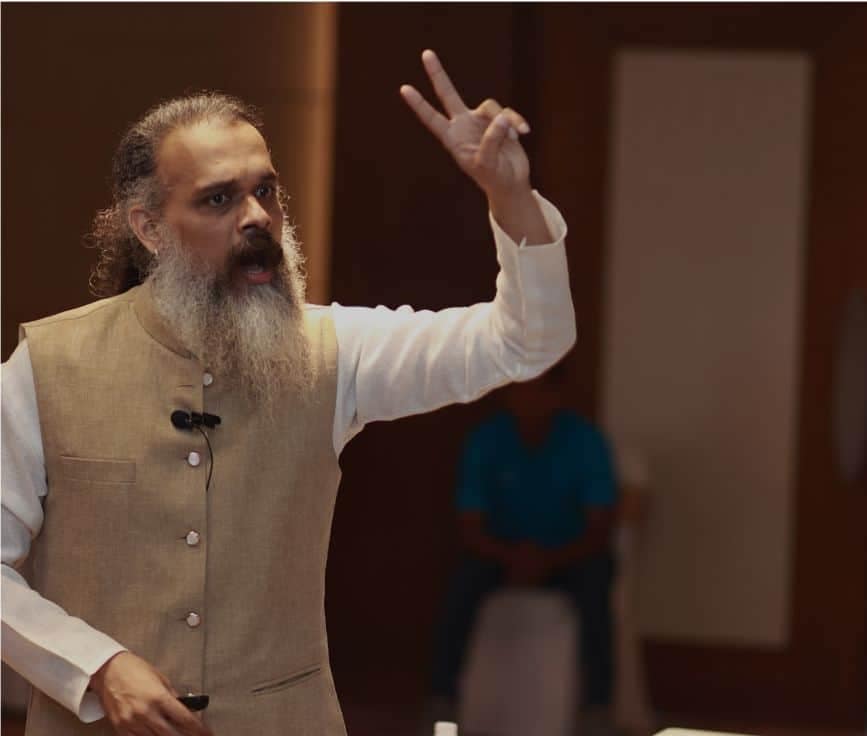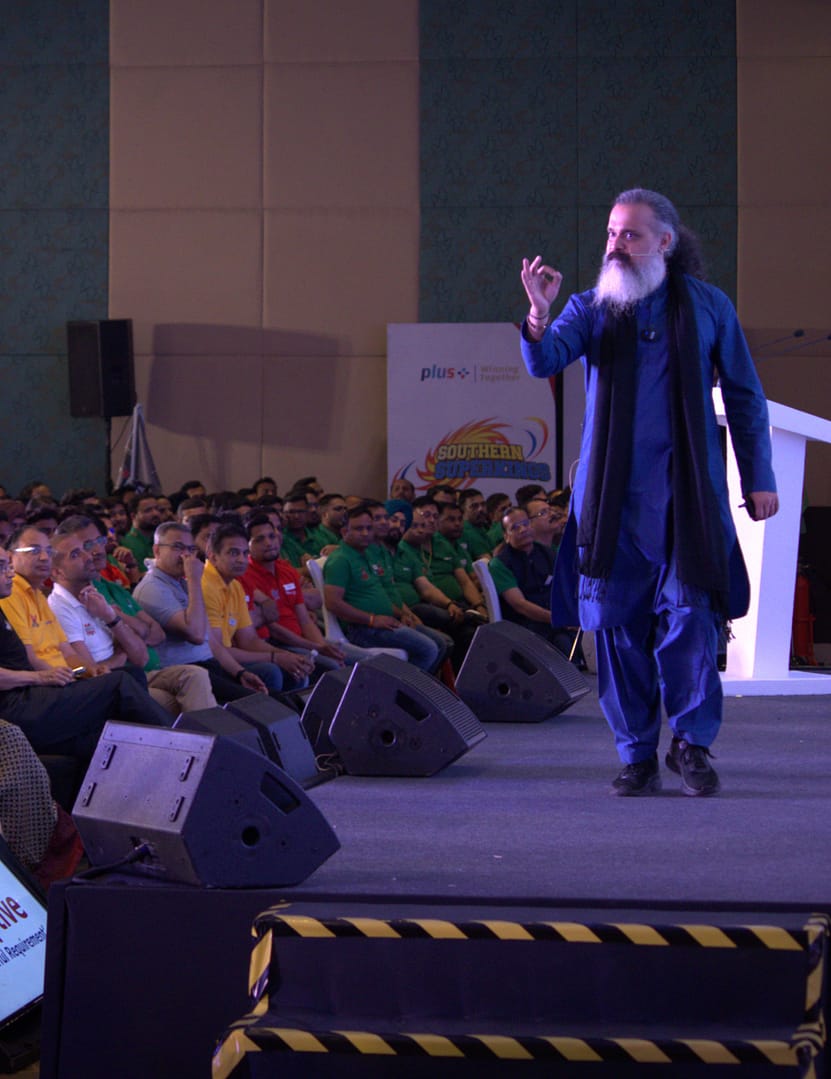Time Management Training - Master Time, Maximize Your Potential
“Learn proven strategies to prioritize, plan, and achieve more daily.
Our Promise
Learning the art of effective planning
Habit Management
Goal Setting
Learning the Art of Delegation
Overcoming Procrastination
Time Management Training
Effective Time Management starts with the commitment to change and action. The key to successful time management is planning and then managing the planned time, which often involves re-conditioning your environment, and particularly re-conditioning the expectations of others. All these require deep introspection, habit management, behavioral transformation, the art of influencing and delegation. Participants are empowered with eye opening facts and powerful techniques which can be used to become effective time managers.
Time Management Training - ‘The Experience’

Methodology & Nature of Time Management Training
- Activities
- Role Plays
- Insightful Sessions
- Experiential Learning
- Brainstorming & Detailed Discussions
Time Management Training
The Power of Willingness
- Commitment to Change - Time Management begins with a commitment to change and the willingness to embrace temporary discomfort.
- Defining Expectations - Clear expectations from the workshop are established for participants.
- 30-Day Commitment - Commitment levels for the next 30 days post-workshop are well-defined to ensure effectiveness.
- Comprehensive Training - The workshop provides actionable steps to enhance Time Management skills.
Self-Introspection
- Time Management is Self-Management - Emphasizes the importance of deep introspection into one’s current activities and time utilization.
- Analyzing Wasted Time - Focuses on identifying wasted hours caused by conscious and unconscious patterns during the day.
- Replacing Wasted Hours - Encourages planning to replace wasted hours with self-development and investment activities.
- Self-Introspection Questionnaire - Helps participants pinpoint areas of improvement in:
- People skills
- Delegation
- Planning and prioritizing
- Finishing skills
- Motivational skills
Dynamics of the Human Mind
- Conflict Handling as a Habit - Participants recognize that their approach to handling conflicts is a habitual behavior.
- Identifying Behavior Origins - The activity helps participants trace the origin of their present behavior.
- Empowerment with Tools - Participants are equipped with tools to change their behavior effectively.
- Understanding the Mind - Highlights the functioning of the mind, including:
- Formation of patterns
- Resistance to change
- Challenges in altering behaviors
3 Ps of Time Management
- The 3 Ps of Time Management - Focuses on:
- Planning
- Prioritizing
- Procrastination
- Importance of Planning - Highlights the transformational effects of effective planning in Time Management.
- Real-Life Examples - Illustrates the concepts using practical, real-life scenarios for better understanding.
Advanced Goal Setting
- Integration of Accountability and Ownership - Combines values of accountability and ownership with Motivation Trigger Setting to create a powerful Goal Setting exercise.
- Beyond the Blame Game - Encourages participants to move past blaming and take complete ownership of achieving organizational goals.
- Advanced Goal Setting - A critical component of our Time Management Training Programs, empowering participants to set and achieve impactful goals.
- Commitment to Change - Time Management begins with a commitment to change and the willingness to embrace temporary discomfort.
- Defining Expectations - Clear expectations from the workshop are established for participants.
- 30-Day Commitment - Commitment levels for the next 30 days post-workshop are well-defined to ensure effectiveness.
- Comprehensive Training - The workshop provides actionable steps to enhance Time Management skills.

- Time Management is Self-Management - Emphasizes the importance of deep introspection into one’s current activities and time utilization.
- Analyzing Wasted Time - Focuses on identifying wasted hours caused by conscious and unconscious patterns during the day.
- Replacing Wasted Hours - Encourages planning to replace wasted hours with self-development and investment activities.
- Self-Introspection Questionnaire - Helps participants pinpoint areas of improvement in:
- People skills
- Delegation
- Planning and prioritizing
- Finishing skills
- Motivational skills

- Conflict Handling as a Habit - Participants recognize that their approach to handling conflicts is a habitual behavior.
- Identifying Behavior Origins - The activity helps participants trace the origin of their present behavior.
- Empowerment with Tools - Participants are equipped with tools to change their behavior effectively.
- Understanding the Mind - Highlights the functioning of the mind, including:
- Formation of patterns
- Resistance to change
- Challenges in altering behaviors

- The 3 Ps of Time Management - Focuses on:
- Planning
- Prioritizing
- Procrastination
- Importance of Planning - Highlights the transformational effects of effective planning in Time Management.
- Real-Life Examples - Illustrates the concepts using practical, real-life scenarios for better understanding.

- Integration of Accountability and Ownership - Combines values of accountability and ownership with Motivation Trigger Setting to create a powerful Goal Setting exercise.
- Beyond the Blame Game - Encourages participants to move past blaming and take complete ownership of achieving organizational goals.
- Advanced Goal Setting - A critical component of our Time Management Training Programs, empowering participants to set and achieve impactful goals.

Formats available for Time Management Training
One or Two-Day Workshop with/without Advanced Goal-Setting Exercise
- Duration: 1 to 2 days
A comprehensive program that includes motivational techniques, experiential learning, and optional advanced goal-setting exercises. Features include:
- Breakthrough activities such as Fire Walk, Broken Glass Walk, and Rod Bending
- Experiential exercises to reinforce mindset shifts and personal growth
- Advanced goal-setting exercises for actionable and measurable results (optional)
- Trigger-based follow-ups to ensure sustainable learning and transformation
Our Partners















































Testimonials
Harrish is our go-to person. If it’s not his area of expertise, he will state so. And if it is, he always unfailingly delivers programmes which ensure participants walk away with a spring in their....
Harrish is our go-to person. If it’s not his area of expertise, he will state so. And if it is, he always unfailingly delivers programmes which ensure participants walk away with a spring in their step, feeling empowered with the new knowledge and confident in their ability to apply it. Harrish’s ability to make difficult concepts simple and relatable, deliver with panache and ensure he handholds participants through a workshop is what makes his workshops unique and valuable for each Star employee.

Harrish, what is striking is that your session focuses both on individual and organization development and testimonies from the participants many months after the ...
Harrish, what is striking is that your session focuses both on individual and organization development and testimonies from the participants many months after the workshop prove the effectiveness of the session in individual development.

Harrish Sai Raman is a persona par Excellence!!! To get an opportunity to perform in front of a distinguished crowd and achieving 100% involvement from the crowd is not ....
Harrish Sai Raman is a persona par Excellence!!! To get an opportunity to perform in front of a distinguished crowd and achieving 100% involvement from the crowd is not a minuscule task. It can only be achieved by someone like Harrish! His session at Hong Kong was just out of this world where every word he spoke had an in-depth meaning which touched everyone’s Heart! You could cater to everything he said in that one and a half hour session. The Rod Bending exercise was really breath taking and well applauded by everyone. Overall a very intriguing motivational session which everyone would love to attend time and again…..

Hi Harrish
I would like to express my heartfelt thanks for your session in our Corporate office conclave in Karjat. Your session was insightful and ....
Hi Harrish
I would like to express my heartfelt thanks for your session in our Corporate office conclave in Karjat. Your session was insightful and touched upon the key aspects that we wished to convey. Your high energy levels left a lasting impression in the minds of each of my teammates.It was a pleasure having you with us! Keep doing the excellent work, God bless!

Harrish’s session was an excellent one and his articulation helped to visualize the logical connection between Belief, State of Mind, Focus and Right Strategy. Could really ....
Harrish’s session was an excellent one and his articulation helped to visualize the logical connection between Belief, State of Mind, Focus and Right Strategy. Could really establish how one’s thoughts can be self-limiting and pull back from giving the best. His punch line of ‘I can but I will not’ was very thought provoking and very reflective of why some people are able to break through the barriers. The Fire Walk activity was a ‘life time’ experience and lesson. It helped a lot to condition the mind towards going for BREAKTHROUGH GOALs which otherwise seem not achievable. Really thankful to him for sharing life changing knowledge in an easy to understand and convincing manner. Simply Brilliant.

Harrish, your session was really a Fantastic and Genuine effort to make people realize their inner potential and come out of their apprehensions. The session has benefited ....
Harrish, your session was really a Fantastic and Genuine effort to make people realize their inner potential and come out of their apprehensions. The session has benefited us to realize the importance of team dynamics and handle change effectively.

It was a Fantastic session delivered for Al Batha. Harrish is an excellent trainer and people are still going gaga about it. The session was different and a fresh perspective on how...
It was a Fantastic session delivered for Al Batha. Harrish is an excellent trainer and people are still going gaga about it. The session was different and a fresh perspective on how we look at things. I am sure more sessions like these will create a shift in our organization.

Dear Harrish, Thanks for conducting a wonderful workshop. The energy level was great and the whole team was raving about this session. I think your workshop has ....
Dear Harrish, Thanks for conducting a wonderful workshop. The energy level was great and the whole team was raving about this session. I think your workshop has contributed to making this offsite an unforgettable one for all of us. We look forward to working with you on future interventions as well. Thanks a lot.

Harrish’s session was one of the best sessions that I have attended in the area of setting goals, managing performance and relationships with team members.
Harrish’s session was one of the best sessions that I have attended in the area of setting goals, managing performance and relationships with team members.

Just finished a really interesting session with Harrish Sairaman on performance management. It re-inforced the things that you instinctively do while ....
Just finished a really interesting session with Harrish Sairaman on performance management. It re-inforced the things that you instinctively do while dealing with people and provided some additional insights. Putting the whole thing into a structure as he did, definitely helps in ensuring a minimum quality of appraisals. The session was quite useful.

The performance management session was an absolute delight. I think some of the insights shared would go a long way in my career not only during appraisals, but in the art of ....
The performance management session was an absolute delight. I think some of the insights shared would go a long way in my career not only during appraisals, but in the art of managing and influencing people around me 365 days a year..

Harish came as a fresh wind. With his effective yet simple self-improvement techniques he started working on my problems. His motivational talk gave me a well required ....
Harish came as a fresh wind. With his effective yet simple self-improvement techniques he started working on my problems. His motivational talk gave me a well required boost of confidence. He was able to accurately understand the issues deep-buried in my sub-conscious mind and design sessions exclusively for me.

I personally had an amazing experience sitting through Harish’s sessions, it transported not just me but the entire team to a different realm and we found the various techniques ....
I personally had an amazing experience sitting through Harish’s sessions, it transported not just me but the entire team to a different realm and we found the various techniques (specially EFT) very useful. I can now see an enhanced productivity with renewed energy level in the entire team!

It was one of the greatest programs I have ever attended. Harrish’s workshop made the challenge of achieving our Goal ‘easy’ and even if we do 20% of what we learnt, our journey ....
It was one of the greatest programs I have ever attended. Harrish’s workshop made the challenge of achieving our Goal ‘easy’ and even if we do 20% of what we learnt, our journey is going to be ‘Easy’.

The session was an absolute delight. I think some of the insights shared would go a long way in my career not only during appraisals, but in the art of managing and influencing ....
The session was an absolute delight. I think some of the insights shared would go a long way in my career not only during appraisals, but in the art of managing and influencing people around me 365 days a year

Fantastic& really useful session, Harrish was hilarious, I really enjoyed session & gained lots of practical insight. The practical tips Harish gave us is something we can start ....
Fantastic& really useful session, Harrish was hilarious, I really enjoyed session & gained lots of practical insight. The practical tips Harish gave us is something we can start immediately in fact me & my hubby has started doing things as directed by Harish. Harish is with huge enthusiasm, he made us understand the topic with brilliant practical examples. His interactive approach was enjoyable & i learn a lot from him. Session was delivered with well-presented material. “It always seems impossible until it’s done”….
Thanks a lot for such wonderful session,we are egar to part of such future more sessions.

“Given the testing times with so many ambiguities and challenges in front of the sales team, Harrish was a breath of fresh air articulating the most powerful and ....
“Given the testing times with so many ambiguities and challenges in front of the sales team, Harrish was a breath of fresh air articulating the most powerful and pertinent messages that completely opened the mind of the team and made them excited about the further challenges / growth plan for the coming year. Harrish’s high energy session loaded with insightful humour and examples that everyone was able to relate to made every attendee attentive and made them absorbed all the ideas powerfully well”
We look forward to many more such sessions from your side and your long lasting partnership with Usha International.

Dear Sir,
The motivational programme conducted by renowned corporate trainer Shri Harrish Sai Raman on the theme ACCELERATE ....
Dear Sir,
The motivational programme conducted by renowned corporate trainer Shri Harrish Sai Raman on the theme ACCELERATE - ACHIEVING PEAK PERFORMANCE, was a life turning experience for me. In just three hours, HSR not only changed several paradigms, but was successful in creating a new set of beliefs and recharging me with loads of confidence and positivity. The two exercises - glass walk and rod bending were very innovative and boosted my confidence level and instilled in me a sense of achievement. Although only a three hour programme, but the takeaways are many. I look forward to attending more sessions in future under the tutelage of Mr. Harrish Sai Raman.

Dear Shri Harish Sai Raman,
It was indeed a great pleasure to have you amongst us on International Women's Day. Your immersive workshop was really ....
Dear Shri Harish Sai Raman,
It was indeed a great pleasure to have you amongst us on International Women's Day. Your immersive workshop was really invigorating and quite thrilling. It was an awakening session for realizing the true human potential. The power of the belief system was felt by the participants through action learning sessions . The workshop brought to focus the cherished human values that are often forgotten in the pursuit of the mundane daily chores. Your passion, energy, rhetorics, humility and simplicity established a great connect with the participants who were spellbound for the three magical hours. The participants carried back profound concepts on gratitude, appreciation, gifting, investing in relationships, spending quality time with family, that truly lead to higher levels of contentment and happiness. We are sure that each one of us would walk the talk and enjoy the gift of life to the fullest. It was indeed a life changing experience for quite a few of us.
NALCO Mahila Samiti places on record the appreciation for the mesmerizing and transformative session. We wish you success in all your future programs and shall look forward to more rewarding sessions in the coming years.

Harrish is the voice that we seek all through our lives, but not many find it. I'd consider myself rather fortunate in that respect. Torn between my personal and professional ....
Harrish is the voice that we seek all through our lives, but not many find it. I'd consider myself rather fortunate in that respect. Torn between my personal and professional pursuits, I met Harrish at a time when I didn't know what I was chasing and to what end. While I met him during a corporate training session, it felt as if I had found my spiritual guide. His explanations are scientific and yet so spiritual and vice versa. He addressed us in a group session of 60, and everyone felt as if they were in a one-on-one session with him! He is so relatable! That how one approaches his or her work also defines one's quality of life was quite a groundbreaking discovery for most of us, esp given the ease with which he explained life's often-missed rationale. And yes, you can't miss his comic timing! It's just so bang on! Between splits of laughter in one moment and deep thinking in the other, Harrish introduced us to a new path of living, one that's more meaningful and purpose-driven! There was an inexplicable calm, that in some way replenished our spirits, after our sessions with him. And we trusted him enough to do the otherwise-rather-impossible tasks when he asked us to. And which is our faith in our own capabilities was restored. Can't thank you enough, Harrish! Will keep coming back to you for more. God bless you!

I had the privilege of attending your session at Bhubaneswar on 3rd March 2022. Having attended many motivational sessions in my career spanning more than 37 years, I ....
I had the privilege of attending your session at Bhubaneswar on 3rd March 2022. Having attended many motivational sessions in my career spanning more than 37 years, I was expecting a regular, yet interesting and inspiring session. But, after being a part of your programme, I can just say, it was mesmerizing and the learnings are so powerful that they have greatly impacted my life. Your lucid, yet powerful communication with strong messages will remain etched in my mind for years to come. Thanks a lot for truly inspiring and motivating me. I would love to attend your programs in future.

Harrish is a phenomenal trainer, had attended one of his power packed workshop wherein i learnt about managing my VUCA world in entirely different and interesting way!
Harrish is a phenomenal trainer, had attended one of his power packed workshop wherein i learnt about managing my VUCA world in entirely different and interesting way!

Thank you for an excellent leadership work
Hello Harrish,
I wanted to thank you for your very energetic ....
Thank you for an excellent leadership work
Hello Harrish,
I wanted to thank you for your very energetic and uplifting session for our Digital Engineering and Tech. Debt team. The team is energized and you have made us realize what it means to meet and work F2F. Appreciate you helping us bring the team together. Look forward to continuing to work with you. Loved your Bombay language 😊

Dear Harrish,
The session was an eye & soul opener on multiple fronts. Every single word was profound in its meaning.
Dear Harrish,
The session was an eye & soul opener on multiple fronts. Every single word was profound in its meaning.

An absolutely wonderful session with a Mind-blowing 🙏 Lesson to reflect every day to recharge your mind and live with the highest potential every minute be it at work or ....
An absolutely wonderful session with a Mind-blowing 🙏 Lesson to reflect every day to recharge your mind and live with the highest potential every minute be it at work or home 🙏. Another level of experience with priceless last five minutes 🙏. It certainly inspired us a lot and will help shape the character of the team in the future. A gem of a motivational speaker.

Harrish Sairaman is a great motivational speaker who keeps the audience engaged through the session. The messages are simple yet profound. The subtle humour that he ....
Harrish Sairaman is a great motivational speaker who keeps the audience engaged through the session. The messages are simple yet profound. The subtle humour that he intersperses during his talks is very enjoyable . The immersive exercises that he does be it bending the rod to prove the power of trust or walking on fire to prove the power of belief are very unique and are powerful motivational tools. I loved his session thoroughly and I always have some takeaways from his session which I practice later on. It has helped me immensely both in my personal and professional space. I wish more and more people to get an opportunity to attend his session.

Harrish’s session is one great experience of providing a scientific lens to various topics of motivational aspects, overcoming fear etc . On the whole an exceptional session and ....
Harrish’s session is one great experience of providing a scientific lens to various topics of motivational aspects, overcoming fear etc . On the whole an exceptional session and greatly delivered by Harrish.

I am always interested in how to view situations and thoughts differently. Harrish has the ability to make us view everything in a different light and get us out of our comfort zones, whilst ....
I am always interested in how to view situations and thoughts differently. Harrish has the ability to make us view everything in a different light and get us out of our comfort zones, whilst being extremely entertaining.

Good coach will make his students see what they can be, rather than what they are ! Both sessions of Harrish was eye opening experiences for me to rethink and change ....
Good coach will make his students see what they can be, rather than what they are ! Both sessions of Harrish was eye opening experiences for me to rethink and change my approach towards way of living and dealing with people around us. Especially walking on burning coal was aha moment, which helps in understanding how belief works and shape our way of working.

As always, the energy level and engagement of the session executed by Harish was outstanding. All of us took away some key insights that will make us more equipped ....
As always, the energy level and engagement of the session executed by Harish was outstanding. All of us took away some key insights that will make us more equipped to execute our daily activities with passion.

I have now been part of 3 in person sessions with Harish- Each of the sessions that I have been part of -there is so much of energy , drive and passion that he brings in- it is truly ....
I have now been part of 3 in person sessions with Harish- Each of the sessions that I have been part of -there is so much of energy , drive and passion that he brings in- it is truly inspiring . There are so many moments of personal reflections and takeaways, hence the learnings continue beyond the session, that can be easily adapted to day to day living as well as on professional front!

I have known Harrish for last 4- 5 years and every time I have attended his sessions I have come out with a transformed perspective on various aspects of life....
I have known Harrish for last 4- 5 years and every time I have attended his sessions I have come out with a transformed perspective on various aspects of life.
The experiential activities that he leverages in his workshops are truly exceptional. And yes his sense humor is at another level in his sessions !
He is also such a wonderful person – who genuinely wants to help , guide and share perspectives in the most authentic way.
Very often when it’s getting tough and there is this part of me that wants to give up , I often say to myself – “if you believe you can, You will”
Thank you Harrish Sairaman – heart felt gratitude.

I have thoroughly enjoyed our sessions with Harrish. He has so much knowledge and experience that when he speaks it makes sense.....
I have thoroughly enjoyed our sessions with Harrish. He has so much knowledge and experience that when he speaks it makes sense. He encourages you to think positively and have faith in your own capabilities. I also enjoy his sense of humor and how subtly he conveys the message that has lasting impact on you. He really encourages us to look at our own biases with an open mind and challenge the ways of working by conducting thought-provoking workshops.
Me and my teams have had some great learnings and I would definitely recommend that you experience one of his workshops


About Harrish SaiRaman (HSR)
“Known for high-energy sessions that blend insightful spiritual humor with breakthrough transformation.”
- Leading Motivational Speaker
- Hypnotherapist
- Transpersonal Regression Therapist
- NLP Master Coach
- Breathwork & Yoga Trainer
- Author
- Life & Spiritual Coach





















